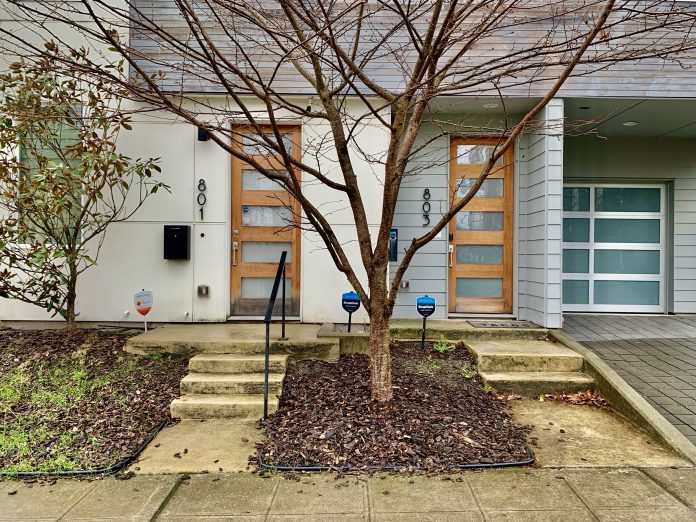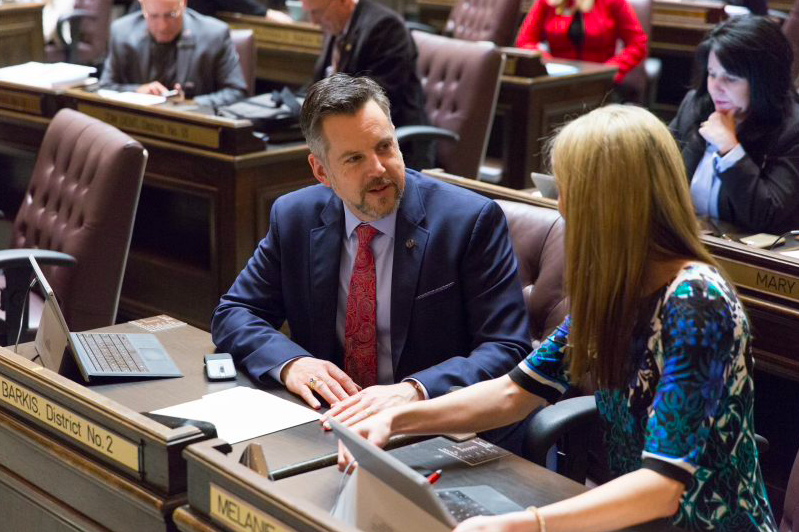Rep. Andrew Barkis hopes 2023 will be the year for supply-side housing legislation in Washington State.
It’s no secret that Republicans have been in short supply when it came to signing on to bills to increase housing in Washington State. Relatedly, statewide zoning reform bills have repeatedly failed in recent sessions, as Democrats have struggled to marshal enough votes and leverage their legislative majorities.
That’s why my interest was piqued when I saw that this year’s missing middle housing reform bill, HB 1110, was being brought forward by a bipartisan team — Rep. Jessica Bateman (D – 22nd District) and Rep. Andrew Barkis (R – 2nd District).
So I reached out to Rep. Barkis, who agreed to speak with me about his side of the story. What were his motivations for bringing HB 1110 forward? Does he see a bipartisan future for housing reform legislation in Washington? Read on to learn more. (Note: This interview was edited for clarity and length.)
Natalie: To kick things off, I wanted to find out more about your decision to co-sponsor the latest missing middle housing bill. What factors influenced you to make that decision?
Rep. Barkis: Great question. You may or may not know that I’ve been in the legislature now for almost seven years. My real job, my background has been in real estate property management for almost 30 years. So I’ve had kind of a front row seat to watching everything going on in the business sector.
Then when I got to the legislature, I brought that experience into my role here. And so, I immediately began working on housing policy and it’s been a challenge [laughs], it’s been a real challenge to be able to move significant policy and I have a track record of always working in a bipartisan way. Trying to move bills such as, say, ADU bill and housing element bill and, and many others. Last year, when this bill [HB 1782] was being proposed, it was not brought forth in the manner which we’ve done this year, and we’ll get a little bit more into that.
As far as how it kind of coalesced last year, it was a priority bill, but I truly believe that the fact that we were not here together for two years, being instead in a virtual session, really hampered our ability to work together. And so, you know, Rep. Bateman and I talked about it, and actually the truth of the matter is as the bill was progressing forward, I did support it. I didn’t sign on to it that year, but I did support it and I worked very closely with her to try to champion it.
When it was brought to my attention that she was struggling getting the votes in her caucus to even get it brought to the floor, she told me what she needed, and I secured from our caucus not only what she needed, but exceeded what she needed in order to pass that bill.
So the false statement that had been circulated around was that Republicans, you know, killed that bill and hated that bill. That couldn’t be more inaccurate. We actually had enough votes to carry that bill. The majority just couldn’t get it to the floor.
Okay, so you flash forward to now and Rep. Bateman and I started working after the session ended and we met a ton of times. We had a big stakeholder meeting back in June that was hosted by the Lieutenant Governor. We committed to this bill and we brought in all parties from the cities to everybody and put together a product. And that was my basis. I said, let’s do this together. We’re better together. So I signed on to it and, you know, it’s one of the centerpieces. I think now the total is up to like 16 bills around supply-side housing – which is a good thing.
Natalie: Thinking about your viewpoint on the bill and its key provisions here at the beginning of the legislative session, is there anything that you’re particularly enthusiastic or excited about?
Rep. Barkis: I think the legislature over the last many, many years has been really the source of the housing problem. I think that for one, we haven’t passed enough legislation to remove the barriers and get at the crux of the problem on the supply side. We’ve had a tendency to do more legislation that puts more burdensome obligations and costs that make it even harder to build homes in Washington State. So I think the provisions of this bill create a foundation for the opportunity to build more types of housing, more units of housing, more affordability, and really in a manner that should be well received.
But again, we have to drive this and to find that balance between the state and local. I think there are times that the state really needs to step in to provide that consistency, that foundation to really push this, um, so that housing is not prevented, where it should be allowed.
Natalie: You mentioned that there were Republicans who were supportive of the missing middle housing bill last session and this session, you’re a co-sponsor of the bill. I also saw that in the Senate, the new transportation oriented housing [TOD] bill that just dropped today also has a Republican co-sponsor in Rep. Chris Gildon [fellow Republicans Drew MacEwen and John Braun are also signed on as co-sponsors].
Do you, do you think that things might be different this year in terms of how both sides of the legislature work together to get housing policy passed?
Rep. Barkis: I hope so. [laughs] I mean, it’s long overdue. I’ve been very public by saying if we walk outta here in April and we have not passed significant, substantial housing policy then I would consider it a failure. So far, we just have not done that, and the people want us to do that. The people of Washington State want us to work together, and we need to find the areas where we have that commonality. This is one issue where I think we can do that now.
There’ll be plenty of other issues that we can fight like cats and dogs about, but I think that’s why we’re seeing one of the questions that was posed was, well, why weren’t there more Republicans who signed onto this bill? I just believe it was a timing issue.
Rep. Bateman and I were so busy trying to get this bill finalized and pre-dropped in session and people were on vacation and gone, and so when it hit the first day, nobody was looking at bills, nobody’s looking to sign on.
If we walk outta here in April and we have not passed significant, substantial housing policy then I would consider it a failure.
Representative Andrew Barkis
We just didn’t have the opportunity to really take this to our caucus to show them and have more people sign on. And that’s why a lot of those early bills, you don’t see that sign on opportunity. Whereas now with the process and the conversations happening, I think I’ve signed on to five bills today.
I believe there will be strong Republican support for this bill. There will be those in my caucus who still have some issues with it and some local control questions out of respect for their constituency. Some of the opposition numbers we’re still seeing, hopefully will be able to work that out as this bill moves along. But, I still feel we have good support. And if the hearing yesterday was any indication, this bill has come a long way in a short period of time with the amount of support it has.
Natalie: If this bill passes, what will make it a success for you? What would you like to achieve with it?
Rep. Barkis: Well, with this bill in particular, the success happens when you see the end result. That’s when I hear that builders are building these types of homes, when I hear that quantities of units available on the market have increased, when housing supply increases then costs go down.
It’s like we say in the rental business, we like vacancy. I think one person says, if you see 10% vacancy, it’s good because that means that price is stabilized and rents go down. Right? So I believe that success will be measured in the implementation of this policy and the actual building.
Also, really to me, it’s going to be the other bills that come alongside it. I’m about to drop a permit reform bill. There’s also an ADU bill that I’m co-sponsoring with Representative Rep. Gregerson. There is just a myriad of these bills and all of them have the ability to have significant impact quickly. And that’s where that success will be. When we can look at that and then go to our constituencies, talk to the stakeholders, talk to our localities, and see these changes start to happen. Then we’ll know we’ve made an impact.
Natalie: Before we run out of time, is there anything that we haven’t touched on today that you would quickly like to discuss?
Rep. Barkis: I really believe that if we can use this session to focus on things that unite and really put aside the things that divide, I think we will have a better opportunity and a better chance to get these bills passed. I’m a little worried about other bills that are floating out there right now, either around some significant climate policy, or when it comes to building landlord tenant law, that’s being floated out, anything that might be detrimental to working together.
I don’t want to take 10 steps forward and then 20 steps backwards. So I think we have to be very careful about that as we look at the entire universe of these bills and how they work together. Because more often than not in this legislature we put forth one thing to make a difference and then right beside it, we’ll put forth something that makes the problem worse. I think we need to be very cognizant of that and it’ll be something for you to kind of keep tabs on as we move through the session.
Correction January 22, 2023: The word “supply-side” was corrected in the subtitle.
Natalie Bicknell Argerious (she/her) is a reporter and podcast host at The Urbanist. She previously served as managing editor. A passionate urban explorer since childhood, she loves learning how to make cities more inclusive, vibrant, and environmentally resilient. You can often find her wandering around Seattle's Central District and Capitol Hill with her dogs and cat. Email her at natalie [at] theurbanist [dot] org.




